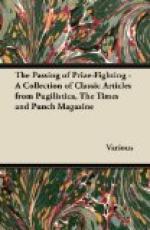“Riddle me, riddlemaree,”
quoth I,
“Is a game that’s
ill to win,
And the day is o’er fair such tasks
to try”—
Said he, “Ye shall know
at the inn.”
With that he suited his path to mine
And we travelled merrily,
Till I was ware of the promised sign
And the door of an hostelry.
And the Romany
sang, “To the very life
Ye
shall pay for bed and board;
Will ye turn aside
to the House of Strife?
Will
ye lodge at the Inn o’ the Sword?”
Then I looked at the inn ’twixt
joy and fear,
And the Romany looked at me.
Said I, “We ha’ come to a
parting here
And I know not who you be.”
But he only laughed as I smote on the
door:
“Go, take ye the fighting
chance;
Mayhap I once was a troubadour
In the knightly days of France.
Oh, the feast
is set for those who dare
And
the reddest o’ wine outpoured;
And some sleep
sound after peril and care
At
the Hostelry of the Sword.”
* * * * *
For our “National Lent”—the War Loan.
* * * * *
[Illustration: Pet of the Platoon. “I DIDN’T HALF TELL OFF OUR SERGEANT JUST NOW. I CALLED HIM A KNOCK-KNEED, PIGEON-TOED, SWIVEL-EYED MONKEY, AND SAID HE OUGHT TO GO TO A NIGHT-SCHOOL!”
Ecstatic Chorus. “AND WHAT DID HE SAY?”
Bill (after a pause). “WELL, AS A MATTER OF FAC’, I DON’T THINK HE QUITE HEARD ME.”]
* * * * *
OUR BOOKING-OFFICE.
(By Mr. Punch’s Staff of Learned Clerks.)
When the eminent in other branches of art take to literature, criticism must naturally be tempered with respect. This is much how I feel after reading Sir WILLIAM RICHMOND’S The Silver Chain (PALMER AND HAYWARD). Probably, however, I should have enjoyed it more had not the publishers indulged in a wrapper-paragraph of such unbounded eulogy. If anybody is to call this novel “a work of great artistic achievement,” and praise its “philosophy, psychology, delightful sense of humour, subtle analysis” and all the rest, I should prefer it to be someone less interested in the wares thus pushed. For my part I should be content to call The Silver Chain by no means an uninteresting story, the work of a distinguished man, obviously an amateur in the craft of letters, who nevertheless has pleased himself (and will give pleasure to others) by working into it many pen-pictures of scenes in Egypt and Rome and Sicily, full of the glowing colour that we should expect from their artist-author. But the tale itself, the unrewarded love of the middle-aged “Philosopher” for the not specially attractive heroine Mary, and the subordinate very Byronic romance of Herbert and Annunziata, quite frankly recalls those early manuscripts that most




